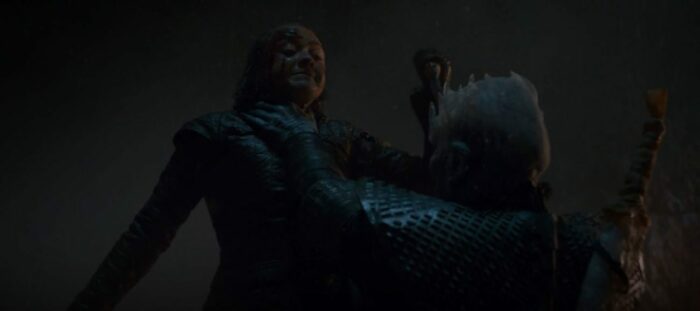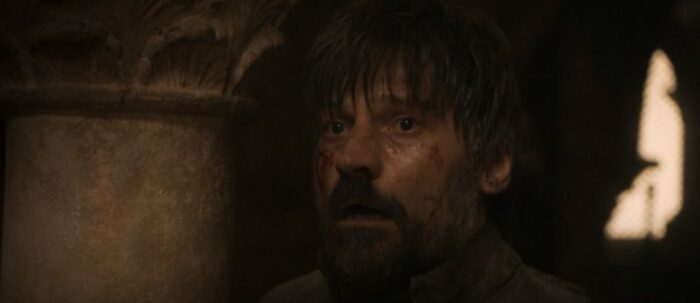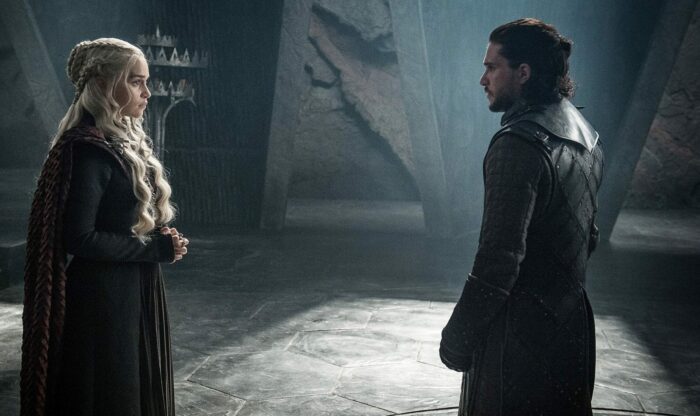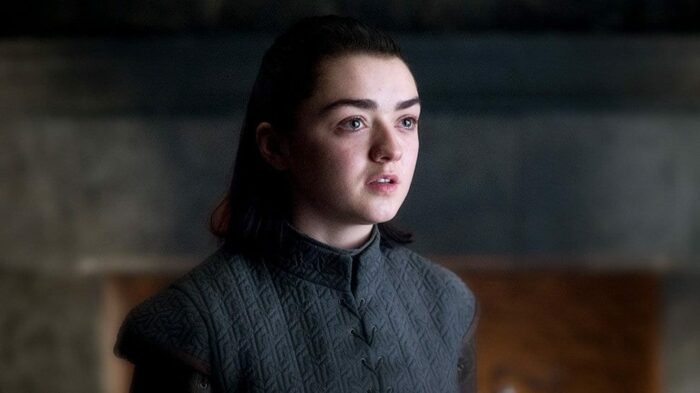I know I’m hardly the only one who was disappointed by the final season of Game of Thrones, but as time has passed since its finale aired on May 19, 2019, I’ve gotten the impression that the feelings of many have softened. This has made me think quite a lot about how my experience has been the opposite. My antipathy has hardened and become sharper. The more I think about how Game of Thrones ended, the greater my distaste for it. My goal here is to articulate why.
It’s not for nothing, of course, that the series ran beyond what was available in terms of its source material as it came to a close. My understanding is that Weiss and Benioff nonetheless had notes from George RR Martin to work from, but I imagine the difference between a fleshed-out story and an outline scrawled on a napkin having some impact on the quality of the work they produced in the closing seasons of Game of Thrones. So, it’s fair enough if you want to make that point.
However, this fails to get at the way in which I felt ultimately betrayed by Game of Thrones, and I think this is because the show betrayed its characters. It betrayed basically all of its characters. It became, in the last instance, the very kind of standard trope fantasy story that it had previously made hay by subverting. And worse, this flattening out of the nuance that had made the show compelling imbued it at the end of the day with a politics that I find despicable, if not pernicious.
You might disagree with that, but I hope you’ll allow me to lay out these political stakes in some detail before you make up your mind, and if you are inclined to embrace the positions that Game of Thrones implies at least have the courtesy to do so forthrightly.
One last word of preamble: I have not read the books on which Game of Thrones is based, so I cannot speak to whether or to what extent the criticisms leveled in this essay apply also to the written work by George RR Martin. Of course, at the time of writing, you haven’t read the relevant work from him either, because it hasn’t been published and maybe hasn’t been written.
That said, I could imagine the possibility that Martin manages to follow the basic outline present in the show and pull off a final subversion that amounts to subverting the subversions that had defined the story to that point. But this would take a deft approach that the TV series is sorely lacking in its final seasons.
All of which is to say that most of my criticisms aren’t about the broad strokes of the final arc of Game of Thrones (though some of them are), but rather more importantly about the details. It’s not that Daenerys has a “heel turn” that bothers me, for example, it’s how this turn was effectuated.
And so I hope you’ll forgive me if and when I stray in the direction of fan fiction as I articulate what I think should have happened. The point isn’t about my personal enjoyment, but about how what could have been a progressive story turned on itself to become a reactionary one. What could have been a feminist story turned on itself to become a misogynistic one. And what could have been a dire warning about the perils of ignoring environmental concerns like global warming became a paean to the tech bro who might save us.

Let’s start with the global warming analogy in Game of Thrones, represented by the White Walkers. They are cold, of course, but that’s not really to the point so much as the opening seasons of the show in particular frame them as a looming threat that the people of the civilized world just ignore. Perhaps they don’t think the threat is real, as we see none other than Tyrion suggest early on.
And this carries forward as the story progresses. We know the threat is very real. We see it. Jon Snow sees it, tries to warn others, and is ignored (or temporarily killed) for his trouble. People won’t listen because they are too busy fighting over the Iron Throne. The analogy is straightforward enough that I can’t believe I’m the only one who drew it: distracted by petty disputes over political power, humanity ignores a looming existential threat, to their peril.
To drive that lesson home, Game of Thrones would have perhaps needed to end with the White Walkers winning, but that would of course have been beyond the pale. I never expected the show to be that daring. But the extent to which it went in the other direction ends up implying that it’s perfectly fine to ignore this kind of existential threat, because when push comes to shove we’ll be able to avail ourselves of impressive knowledge that will miraculously save us.
It’s true that the final battle with the White Walkers lasted for a full episode, but that they were vanquished in this episode early in the final season so that the action of the series could return its focus precisely to the battle for the Iron Throne delivers the opposite lesson from the one implied by the logic of the entire story up to this point.

What would have made more sense would have been if Daenerys had declined to help the North because she was so hellbent on taking the throne, they’d lost the battle of Winterfell, and ice zombies wreaked havoc through Westeros before perhaps finally losing as Cersei and Dany were forced to work together to fight them off (or something along these lines—again, what would have been most powerful would have been the White Walkers winning, but I’ve been called a monster for wanting that ending).
It actually felt out of character that Dany was convinced to help the North, as her entire character arc had been in the direction of an obsession with the Iron Throne. It makes perfect sense that she turned sort of evil, but everything was leading in the direction of this happening in a way where she was led to despotism in the name of her ideals about justice. That’s what was in her character, and you could see it before she ever got to Westeros.

Instead, Game of Thrones has her sent into an irrational fury following the death of Missandei. She starts killing literally everyone in King’s Landing indiscriminately. What’s objectionable is not even her murderous streak here (though obviously the ordinary people she’s killing don’t deserve it) so much as the way in which this strong woman is ultimately cast as a hysterical one. It’s strongly implied that Jon’s rejection of her at least primed her for this—that the fire she rains down is the fury of a woman scorned.
This is the misogynistic note: that somehow for all of her strength of spirit, reason, and leadership prowess throughout the series, Daenerys is in the last instance a crazy bitch who can’t be trusted. Her emotions lead her to an indiscriminate rage, so Jon has to kill her. And don’t get me wrong, given the way the story goes he pretty much does indeed have to kill her, but the broader implications about who is fit to lead and who isn’t are hard to ignore.

Dany is hardly the only character to be betrayed by Game of Thrones in its homestretch, however. Consider Jaime Lannister. His entire story is a prolonged redemption arc, as you’ll recall we first meet him doing some incest with Cersei before kicking Bran out a window.
The thing is, the redemption arc works, or at least almost does. A constant unease remains in our estimations of Jaime, nicely paralleled by how everyone in the world of the story feels about him. But we’re tugged to root for him, or to at least root for his redemption.
Then literally immediately after he seems to have achieved it, before we could even really decide he had, the rug is pulled out. He leaves Brienne and goes back to Cersei.
Again, one could imagine a way in which this might have felt earned. When push comes to shove his heart is with his sister and so on. That is even there in the text of the show, but it is so quick it hardly feels motivated. It’s like the Cliff Notes version of regressive character development.
As such, Game of Thrones suggests the lesson that the bad guys are who we thought they were, and it is maybe stupid to give people a second chance, which is basically the opposite of what Jaime’s story was supposed to be about. For this to work, we’d have to understand what makes Jaime need to return to his sister, and that would require believing in the depth of their (romantic) love.

Jaime’s betrayal feeds into how Game of Thrones forms something of an apologia for incest, whether it means to or not. Insofar as Jon’s spurning of Daenerys leads her to murder innocent masses of people, and insofar as we’re supposed to understand (if not condone) Jaime’s decision to return to Cersei, Game of Thrones at least asks us to ponder whether incest is really so bad after all.
If we take Claude Levi-Strauss’s suggestion about the origins of the incest taboo, we might conclude that this is another way that the politics of Game of Thrones is ultimately regressive. Levi-Strauss linked the prohibition against incest to discouraging endogamy and encouraging exogamy. That is, in sociological terms, the whole point can be viewed in relation to a broadening of concern in the direction of universality, whereas incest crosses the limit of permissible investment in one’s own tribe. Incest is the excess of right-wing politics in its insularity, whereas Jaime’s relationship with Brienne represents a progressive sexual politics, as it is a (possible) love between equals based on mutual respect, outside of any tribal interests.
The stakes here aren’t just interpersonal.
To be fair, I’m not even sure that the creators of Game of Thrones understand this. There are many indications that they are bad interpreters of their own work, or too stuck on the notion that their intention defines the scene rather than the diegetic action. Exemplary here is the idea that Jaime’s rape of Cersei in Season 4 becomes consensual, or wasn’t rape because it wasn’t intended to be. I regret to inform you that this is very much still rape and indeed the whole idea of it “becoming consensual” doesn’t make the scene better but worse—it plays as the fantasy of a man inclined to force himself on a woman, convinced that she’ll ultimately like it, or should.
The truth of Game of Thrones is what’s there on the screen, and no appeal to authorial intention can change this. Increasingly during its final seasons, commentary by those behind the scenes became infuriating, as though they failed to understand that remarks about what happened couldn’t replace actual work within the show to make the narrative cogent.

Game of Thrones ultimately bolsters a certain style of patriarchal thinking, shot through with a good amount of paternalism. Where that really comes to a head is in the conclusion of the series with Bran taking the Iron Throne.
Early on, I recall friends positing that the overall narrative of the series was about the birth of democracy. (I also recall a friend suggesting Game of Thrones was feminist, which seems just patently absurd now.) I never quite thought it was that, but I never expected its ending to be so thoroughly anti-democratic.
Bran is appointed by a group of gathered elites. The conclusion isn’t that there is something inherently bad about monarchy, even if the idea of basing it on bloodline is problematized to the point of being rejected. The move is still to have the heads of powerful factions choose a King, which is better insofar as it involves the thought that there should be some selection criteria beyond happenstances of birth, but is thoroughly anti-democratic in the presumption that the people couldn’t be the ones to decide for themselves who should lead them.
Conceptually speaking, Game of Thrones suggests that we need a philosopher king. Indeed, the resonances with Plato’s Republic are self-evident if you’ve read it. There, Socrates argues explicitly that the philosophers need to be the ones to rule because they are the only ones who don’t want to.
Now, I have a graduate degree in Philosophy, and I could well give you a charitable reading of Plato on this question. But that wouldn’t fit with what happens in Game of Thrones so much as the surface-level uncharitable reading does. If we’re supposed to be happy with the choice of Bran, this is playing on the idea that the knowledgeable should be in charge, and thus not really in line with a Socratic notion of philosophy I might defend (philosophy as the love of wisdom, knowing that one knows nothing, etc.), but in line with a kind of technocratic ideal.
It’s kind of like suggesting that because all of the other candidates are problematic, the ideal choice is Michael Bloomberg, or thinking that the solutions to all that ails us lie in tech, and perhaps worshipping Elon Musk. It’s a fantasy—and of course Game of Thrones is a fantasy show—but whose fantasy is it?
The idea that Bran doesn’t want the Iron Throne is on shaky ground as he implies he knew they were going to give it to him and that’s why he traveled across the world to be there. His putative detachment is actually rather creepy, and the idea that even those assembled would rally behind him feels unearned.
It actually plays more as Bran’s fantasy—or the fantasy of those like Bloomberg and Musk, I imagine—than anything: to have the powerful who have been busy squabbling unto death realize that he’s better than them because he’s really smart.

And it’s not for nothing that it is Bran who comes up with the plan to kill the Night King. If we follow the analogy with global warming, this amounts to the fantasy that sufficient knowledge will save us. Game of Thrones ends up asking us to be happy with a tech bro as king. Perhaps that term is inapt or has become almost meaningless, but I hope you know what I mean.
The problem isn’t with the idea that those in power should have a breadth of knowledge and the capacity for critical thought—if only!—the issue lies in the way that Bran’s demeanor lands with an air of condescension. With the ending of Game of Thrones, it’s as though the show is saying that people aren’t capable of ruling themselves because they are just too stupid and egoistic. Our main cast of players over the course of the series can be seen as exemplars.
No one even knows what Bran knows! We don’t understand the scope of his powers by the end of Game of Thrones, and certainly the characters within the story do not either. So it’s not just a move to the notion of a leader who is very intelligent (that’s great) but to the ideal leader being framed as one who has secret knowledge beyond the grasp of the common folk. Bran’s wisdom is inscrutable.
And, once again, the development feels unearned in terms of Bran’s character, which is perhaps betrayed more than any other in Game of Thrones insofar as it dissolves over the course of the final season. Who is Bran at this point? What does he want? Does he want things? Does he care about people? I can’t claim to know.
Is Game of Thrones implying that we ought to be led by someone who lacks all personal attachments? That seems problematic.

There are other criticisms that could be leveled against Game of Thrones, of course. Arya goes from being a richly compelling protagonist to basically a side character, for example. Even if she kills the Night King, it’s more like she’s a weapon being deployed by the men in charge than she is a young woman with agency.
By and large, everything coheres in a reactionary politics as the series closes. Those elements of the story that seemed progressive (and were) are one by one brought into that fold. There will be no liberation of women, nor restructuring of class relations. This isn’t about the birth of democracy or the perils of insular thinking.
It’s a return to the status quo, but better. Because now a really smart man is in charge who knows what can change and what can’t. Perhaps he can’t explain, but we should trust his algorithms.
It’s disgusting.


Fabulous. Thank you.